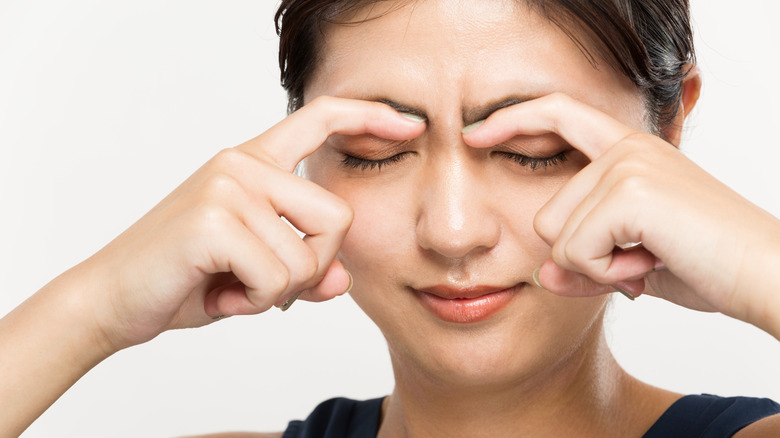The Real Reason Your Muscles Twitch
Whether it's an annoying twitch in your eyelid, or a sudden, jarring jerk of the legs when falling asleep, involuntary muscle movements can be, at best, annoying or, at worst, a real cause for concern.
The good news is that muscle twitches are a very common occurrence that most people experience at one time or another, and, in most cases, they are nothing to worry about. Dr. Charles Kim, assistant professor of rehabilitation medicine and anesthesiology and a pain management specialist at Rusk Rehabilitation at NYU Langone Health in New York City, told US News & World Report, "For the vast, vast majority of people, [muscle twitching] is benign."
Muscles are made up of fibers that are controlled by nerves. When the nerves misfire — that is, transmit impulses at unexpected times — a group of muscle fibers may suddenly contract, causing a twitch or jerking movement (via Verywell Health).
Finding balance in life can help prevent twitching
Usually, muscle twitching is caused by an imbalance in the body due to lifestyle factors. Strenuous physical activity or exhaustion, stress or anxiety, nutrient deficiencies, electrolyte imbalance, and dehydration are just some of the sources of muscle twitching, and doctors will usually ask about these conditions first, per Verywell Health.
"Oftentimes, the muscle twitching is a sign there's some sort of imbalance going on in your life," Dr. Charles Kim said. "I think the most important thing is just looking at your lifestyle and (seeing) what sort of things may be contributing to it." If your diet is lacking nutrients, you're overworked, or you are not moving your body enough or getting enough rest, according to Dr. Kim, it's beneficial to find ways — like regular exercise and meditation — to improve those factors. "It's achieving a balance." (via US News & World Report).
If muscle twitching is persistent and doesn't go away in a few days, or if it is combined with other symptoms, like muscle weakness or atrophy, it's important to see your doctor, as it could indicate a more serious problem. A health care provider can order diagnostic tests to see if the twitching might be caused by an underlying condition that requires treatment.


